Last week, I had a conversation with an elderly woman who came from one of the rural communities with some eye problems. The eyes were red, teary, and watery. I was even thinking that she was just having an allergy or something. Before she started narrating how she started noticing a whitish something 'growing in her eyes'. This started many years ago. It has been painless but progressively her vision started declining. Things started getting blurred and she felt great discomfort from a high-intensity light like the headlamp of a motorcycle or car.
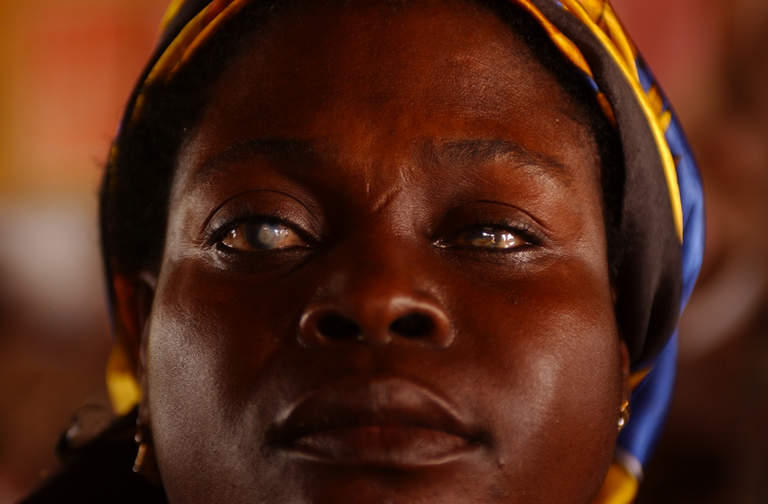
By Shane T. McCoy, Public Domain, Wikimedia
Along the line, she met a herbal medicine man who gave her some eye drops to use and 'dissolve' the growth. After some days of using the eye drop, her eyes became red, teary, and itchy. She was then advised to go to the hospital before she finally came to the clinic. Before referring her to an eye doctor (ophthalmologist) for expert care, I had to take several minutes to counsel her and correct the many misconceptions she had about her eye problem.
From her primary symptoms, she had a cataract, and a cataract is NOT A GROWTH in the eye. It's just changes that occurs in the lens of the eye due to the degradation and aggregation of the proteins in the lens. This degradation and clumping together usually occur with advancing age, however, there are many other causes of cataract apart from old age, which can occur in younger people or even newborn, though age-related cataract is the commonest.
Her second misconception was that the eye drop will dissolve the cataract. But a cataract is an integral change in the lens and cannot be dissolved by putting any medication in the eye. The only available treatment for cataracts is a surgery where the doctor removes the opaque lens and replaces it with a clear synthetic lens. In one of the procedures, called phacoemulsification, the doctor uses an ultrasound to break the lens and put a new one. We will discuss the treatment options in detail in the later part of this topic.
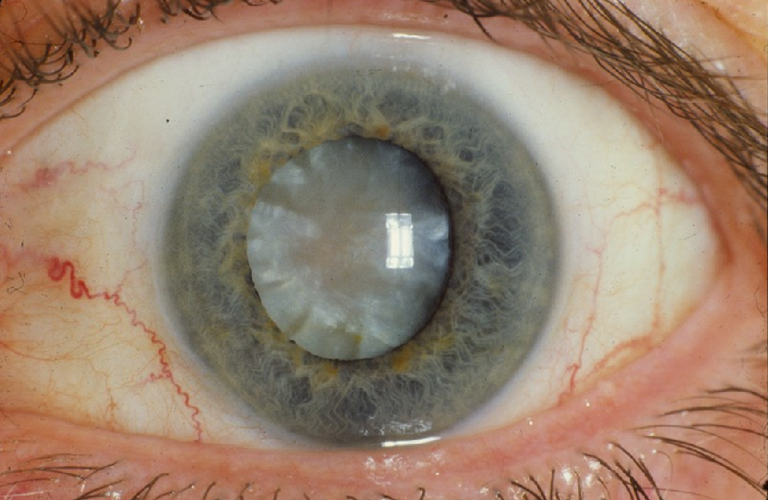
By NIH Image Gallery from Bethesda, Maryland, USA - Cataract, Public Domain, Wikimedia
Her story made me understand that even though these eye conditions are very common and many people seem to know about them already, there are still some who are yet to have the right information on these problems. And without the right information, they go ahead and do all sorts of things that may end up damaging their eyes.
I think there is a need for more awareness campaigns on common diseases, especially in our rural communities where we have the majority of the population who may not have access to health education, the internet, or even good and functional health facilities. These contribute to poor health-seeking behavior and some dangerous health practices as seen in this case.
So this week, I decided to talk about some of these very common eye problems amongst us. In my last post, I talked about glaucoma which is the second commonest cause of blindness. Today I want to talk about cataracts which are the number one leading cause of blindness globally.
In this discussion, I will highlight the causes of cataracts, the types and presenting symptoms, the available treatment options, and most importantly, how we can protect our eyes from getting this cataract.
HOW DOES A CATARACT OCCUR
The lens in our eye is a biconcave, crystalline and transparent structure located behind the iris. It functions to focus light on the retina from where the impulse is sent to the brain through the optic nerve. Therefore, for us to see any object, light from it must pass through the lens. However, for some reason, the proteins in this lens can get degraded and clump together. This changes the lens from its original transparent nature to become cloudy and opaque. This alters the transmission of light through the lens and leads to vision problems as seen in cataracts.
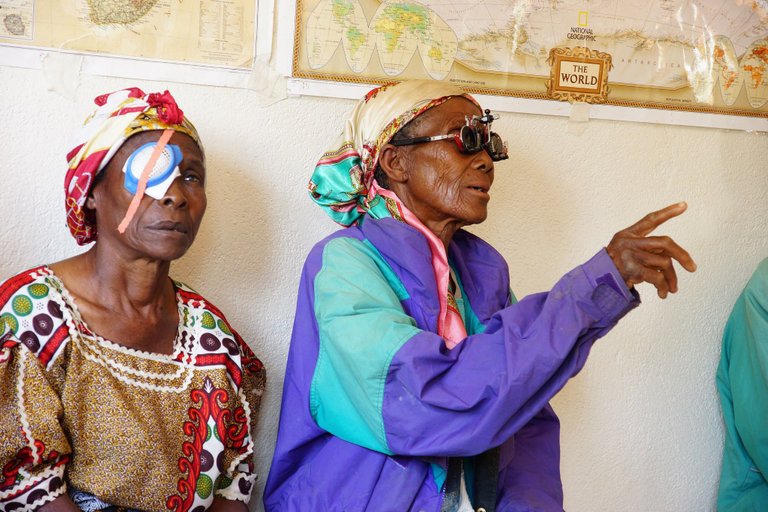
By Paul Holden Lubango Angola - Own work, CC BY-SA 4.0, Wikimedia
CLASSIFICATION OF CATARACTS
The lens is made up of many parts which include the nucleus which is the central core of the lens, the cortex which immediately surrounds the nucleus, and then the lens capsule which envelopes the cortex and nucleus. The capsule has anterior and posterior lens capsules. Any of these parts of the lens can get cloudy and cataracts can be classified morphologically based on the part of the lens where the opacity occurs. Hence we have nuclear cataracts, cortical cataracts, capsular cataracts, subcapsular cataracts, etc.
Cataracts can also be classified according to the maturity of the cataract. So we have immature cataracts where we have a scattered mixture of clear and opaque areas on the lens, mature cataracts where the entire lens is opaque, Intumescent where the cataract absorbs water and gets swollen, hyper mature cataracts where the water leaks out of the lens making the capsule to be wrinkled and finally morgagnian cataract where the lens cortex totally liquefies and the nucleus shrinks down.
The last classification of cataracts is according to age. Here we have congenital cataracts which occur from birth, infantile cataract which occurs in early childhood, juvenile cataract which occurs in late childhood, pre-senile cataract in late adulthood, and senile cataract in old age which is the commonest.
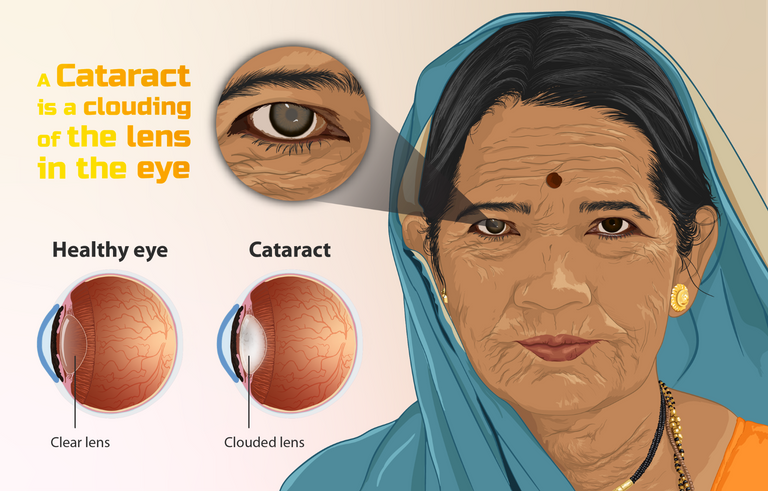
By Myupchar, CC BY-SA 4.0, Wikimedia
WHAT ARE THE CAUSES OF CATARACTS?
There are many causes of cataracts and I have mentioned some of them above like age and congenital causes. Other causes include trauma like a blunt or penetrating injury to the eye, radiation, etc. Chronic use of drugs like steroids, amiodarone, allopurinol, etc. Heredity also plays a very important role in the etiology of cataracts. Other diseases like diabetes, glaucoma, atopic dermatitis, uveitis, parathyroidism as well as intrauterine infections like Rubella, Toxoplasmosis, Cytomegalovirus, etc have also been implicated.
The risk factors for cataracts include advancing age, prolonged exposure to ultraviolet radiation, poor nutrition and low socioeconomic status, dehydration, alcohol, smoking, etc. Some of these increase the reactive oxygen species which harm the eyes.
The diagnosis of cataracts is usually made by carrying out some eye test which includes a slit lamp examination or the use of an ophthalmoscope. The visual acuity is also checked as well as the intraocular pressure and other opthalmologic examinations.
SYMPTOMS OF CATARACTS
Due to the opaque nature of the lens in those with cataracts, they start experiencing blurry vision, objects start appearing double (diplopia), reduced perception of color, increased sensitivity to glare, seeing halos around light, and frequent changing of prescription glasses which may be an early sign.

By National Eye Institute,National Institutes of Health, Public Domain, Wikimedia
TREATMENT FOR CATARACT.
The definitive treatment for cataracts is surgery. However, there are some non-surgical modalities to aid in the management like providing a brighter illumination for reading materials, wearing special glasses with anti-glare coating, getting new prescription glasses etc.
It is not every cataract that needs surgery. The indication for surgery is based on the patient's choice of improved vision or when there is a complication. Cataract surgeries are always successful and take a little time to perform with less hospital stay.
Before the surgery, biometry is always done to select the appropriate lens implant to meet the patient's individual needs. However, with the newest technology of intra-operative aberromety (Optiwave Refractive Analysis, ORA) the surgeon can take the refractive measurement while the operation is going on which helps to provide the best optimal lens power most suitable for the patient.
The surgical options include Phaecoemulsification where the surgeon uses an ultrasound wave to break the cataract lens and bring out the pieces, then replace it with a synthetic artificial lens. Another Option is the Intracapsular Cataract Extraction (ICCE) where the lens and lens capsule are both removed and a new lens put in a different location. This is not a good option and is rarely done now.
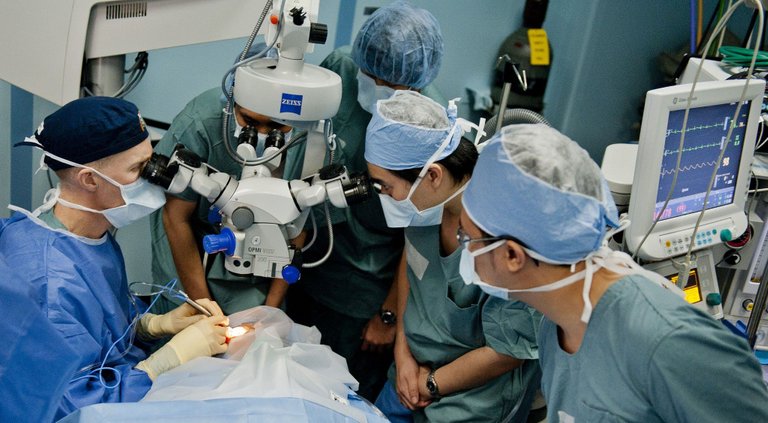
By Official USA Navy Page, Public Domain, Wikimedia
The more frequent option is the Extracapsular Cataract Extraction (ECCE) where the lens is removed, leaving the capsule behind, and then a new intro ocular lens is then inserted. This is a preferred option to ICCE as it takes a lesser incision and time to perform and lesser complications. Other surgical options include Small Incision Cataract Surgery (SICS) and femtosecond laser.
Like every surgery, cataract surgery may have a few complications but generally, the outcome of the surgery is always very good and beneficial to the patients.
HOW CAN WE PROTECT OUR EYES FROM CATARACTS?
A very important step in preventing visual loss from cataracts is a regular eye check, especially for those who have first-degree relatives with cataracts. Early detection is always very beneficial.
Eating healthy foods like fruits, vegetables, vitamin c and other foods rich in antioxidants is very helpful. It is also important to wear protective sun shades while in the sun to protect our eyes from ultraviolet lights which is a potent risk factor for cataracts. Lifestyle modifications like quitting smoking and alcohol are protective.
Finally, stay healthy, and hydrated and avoid chronic diseases like diabetes, obesity, and hypertension. The eyes are very important sense organs in our body, let's us do our best to protect them at all times.
Thanks so much for reading.
For references and further reading;
It is really scary to go blind ooo especially if it is not from birth, imagine what poverty and lack of adequate health care can cause, I feel really sad when I read things like the story of this woman, and I really hope to have the capacity to do some good to the community some day.
There are really alot of errors going on in these rural communities that need our attention. Some very harmful health and obstetrics practices, FGM, poor health seeking behaviour and the delays in getting urgent medical intervention. Alot still need to be done to improve the lives of people in those communities especially the low socioeconomic class. As you rightly said, someday we will be able to make our impacts in those places.
Thanks so much for your contribution and support. I appreciate
Thanks for your contribution to the STEMsocial community. Feel free to join us on discord to get to know the rest of us!
Please consider delegating to the @stemsocial account (85% of the curation rewards are returned).
Thanks for including @stemsocial as a beneficiary, which gives you stronger support.
Many thanks for your support. I appreciate
I really liked your publication, because you explain very clearly what it consists of, the images you use are very appropriate to explain the subject clearly.
Unfortunately cataracts are usually detected very advanced because people come very late to hospitals.
And bearing in mind that it is something that progresses relatively slowly, we can see that people adapt to the low visibility, until a moment comes when they can hardly see anything and that is when they decide to seek care.
That's very correct Sir. Late presentation has always been a great challenge. When detected early, there is always a far better prognosis than the late cases.
Thanks so much for your wonderful contribution and support.
Great information here. you deserve my reblog.
Thank you for sharing.
I am glad that you found the information useful.
Thank you so much for the support. I am very grateful 🙏
Congratulations @alidickson! You have completed the following achievement on the Hive blockchain and have been rewarded with new badge(s):
Your next target is to reach 8000 upvotes.
You can view your badges on your board and compare yourself to others in the Ranking
If you no longer want to receive notifications, reply to this comment with the word
STOPCheck out the last post from @hivebuzz:
Thanks so much @hivebuzz . It's a great pleasure
You're welcome @alidickson! Have a nice day 😊👍
Nice write-up thanks for sharing.